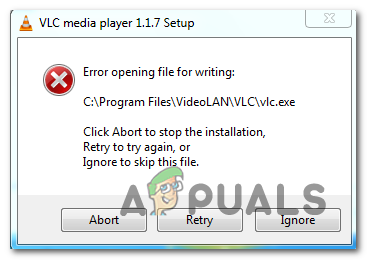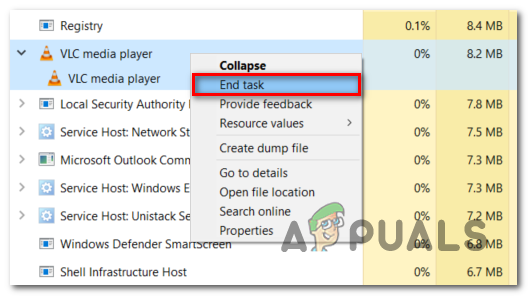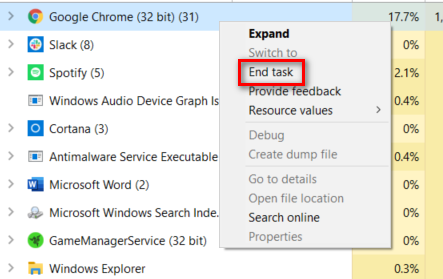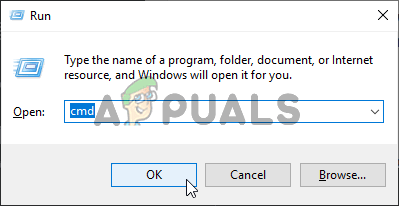Most commonly, the ‘Cannot Open File for Writing‘ error is caused by multiple instances of VLC or other applications using LibVLC. To fix this, you can use Task Manager to close any conflicting VLC instance while the installation or updating sequence is taking place. However, some browsers also have the potential to interfere with the legacy way of updating the VLC Media Player application. And under certain circumstances, some type of system file corruption can be the determining factor why your VLC Media Player installation is no longer able to update.
Method 1: Closing all VLC Instances
As it turns out, the most common cause that will cause the ‘Cannot Open File for Writing‘ error is a situation where multiple VLC instances (or any other applications that are also using LibCLC) are actively running on your machine. If this scenario is applicable, you can fix the issue swiftly by opening Task Manager and terminating all running instances of applications using LibVLC. Several affected users have confirmed that the issue was resolved as soon as every running instance was closed. Note: If you don’t want to use Task Manager, you can simply restart your computer and repeat the action that’s currently causing the issue as soon as the next startup is complete. Here’s a quick guide on closing all VLC instances that might end up causing the ‘Cannot Open File for Writing‘ error: In case this scenario wasn’t applicable or it didn’t resolve the issue, move down to the next potential fix below.
Method 2: Close all browser instances
One unlikely cause that might contribute to the apparition of the ‘Cannot Open File for Writing‘ error is an installation interference caused by your default browser. As several affected users have reported, VLC’s ability to update itself can be also interrupted by an open instance of Chrome, Firefox or Brave browser. If this scenario is applicable, you should be able to fix the issue by using Task Manager to close any active browser instance that might be causing the issue. Here’s a quick guide on how to close any browser instance in order to resolve the ‘Cannot Open File for Writing‘ error: In case you’re still encountering the same ‘Cannot Open File for Writing‘ error, move down to the next method below.
Method 3: Running SFC and DISM scans
As it turns out, the issue can also occur due to some kind of System File Corruption that ends up affecting your operating system’s ability to install new software. If this scenario is applicable, you should be able to fix the issue by running a couple of native utilities (DISM and SFC) that were designed to find, fix or replace corrupted instances. Although the two utilities have similar functionality, they do things differently. For example, DISM (Deployment Image Servicing and Management) relies heavily on a subcomponent of WU to replace corrupted data with healthy equivalents. On the other hand, SFC (System File Checker) is an entirely local tool that uses locally cached data to fetch healthy files when corrupted instances are found. Since both utilities have their own strong suits, we recommend that you run both in quick succession in order to maximize your chance of resolving the ‘Cannot Open File for Writing‘ error:
How To Fix VLC Media Player Crashes when Playing .MKV FilesHow to Convert Videos Using VLC Media PlayerHow to Record Your Webcam with VLC Media Player?Fix: Error 1310 Error Writing to File



